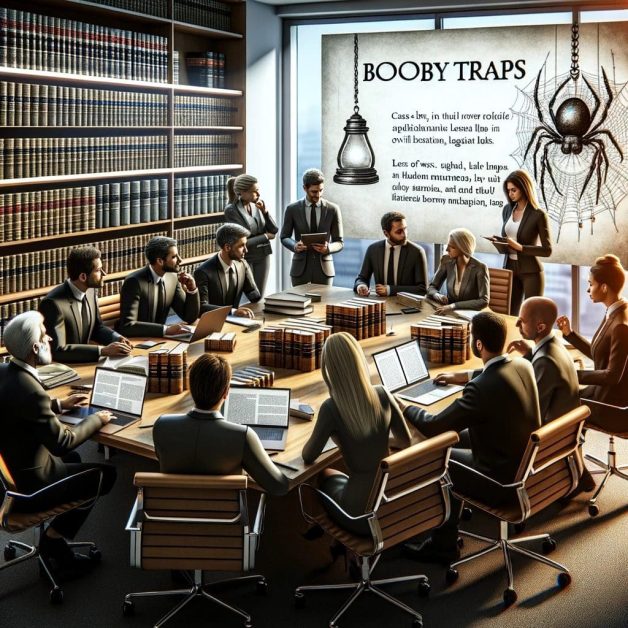Booby traps, often seen as the stuff of wartime or adventure movies, carry significant legal implications in both civil and criminal law. This article delves into the complexities surrounding trampas explosivas, highlighting the legal ramifications for those who set up or fall victim to these hidden hazards. Understanding the legal landscape of booby traps is crucial for property owners, legal professionals, and the general public to navigate potential legal pitfalls and uphold safety and accountability.
The Legal Definition and Implications of Booby Traps
At its core, a booby trap is a device or setup intentionally designed to detect, surprise, or harm an individual upon unsuspecting interaction. While the concept might conjure images of elaborate schemes in historical or fictional contexts, modern legal systems address booby traps with the utmost seriousness due to their potential to cause unwarranted injury or death. In criminal law, deploying a booby trap can result in severe charges, including assault, manslaughter, or even murder, depending on the jurisdiction and outcomes of the trap’s deployment.
Civil law also grapples with booby traps, particularly within premises liability. Property owners may face lawsuits if someone is injured by a booby trap on their land, regardless of the victim’s reasons for being there. This aspect underscores the principle that property owners have a duty to ensure their premises are safe and free from intentional harms, extending even to trespassers in some legal frameworks.
Historical and Modern Contexts of Booby Traps
Historically, booby traps have been used in warfare to gain strategic advantages, often remaining long after conflicts have ended, posing risks to civilians. However, the use of booby traps is not confined to warzones. Modern cases involve homeowners setting traps to deter burglars, only to face criminal charges and civil lawsuits when those traps inadvertently harm innocent parties or even law enforcement officers.
Navigating the Consequences: A Legal Perspective
The consequences of setting a booby trap extend beyond the immediate harm caused. From a legal standpoint, the intentional nature of a booby trap complicates the defense in both criminal and civil cases. In criminal cases, the premeditation involved in setting a trap can aggravate charges, reflecting the law’s stern view on endangering human life intentionally. In civil cases, victims of booby traps can claim damages for injuries, with courts often siding with victims due to the inherently hazardous and deceptive nature of traps.
Preventive Measures and Legal Advice
For property owners, understanding the legal prohibitions against booby traps is paramount. Legal professionals advise against any measures that could harm an intruder, suggesting instead the use of security systems that alert authorities without causing physical harm. For individuals who might encounter booby traps, especially in areas with historical uses of such devices, awareness and caution are crucial.
Ethical Considerations and Legal Reform
The ethical considerations surrounding booby traps are complex, touching on the rights of property owners to protect their premises and the societal imperative to preserve life. Legal scholars and reform advocates argue for clearer guidelines and reforms that balance these considerations, ensuring that laws deter the use of harmful traps while protecting individuals’ rights to security and safety.
Conclusión
In conclusion, the intricate legal and ethical landscape surrounding booby traps in both civil and criminal law underscores the paramount importance of human life and public safety over property protection. Through a detailed examination of legal principles, notable case studies such as Katko v. Briney y United States v. Davis, and the subsequent legal discourse, it is evident that the judicial system consistently prioritizes the prevention of harm and upholds the dignity of individuals. These cases serve not only as cautionary tales but also as legal benchmarks that discourage the use of dangerous devices for property defense, advocating instead for safer, non-lethal alternatives.
As society continues to evolve, so too does the legal framework governing the use of booby traps, with a growing emphasis on ethical considerations and the responsible use of technology in safeguarding premises. The message from both the legal community and public policy makers is clear: the deployment of booby traps, regardless of intent, presents unacceptable risks that far outweigh any perceived benefits of deterring trespassers or protecting illicit operations. Property owners and legal practitioners are advised to heed these legal precedents, embracing methods of protection that ensure the safety of all individuals while navigating the potential legal liabilities inherent in the use of booby traps.
Thus, the collective wisdom derived from examining the multifaceted implications of booby traps illuminates the critical balance between defending one’s property and adhering to the ethical and legal standards that govern our society. The consensus points towards a future where legal and moral considerations harmonize to foster a safer and more just community for everyone.
Divulgación: Generative AI creó el artículo









